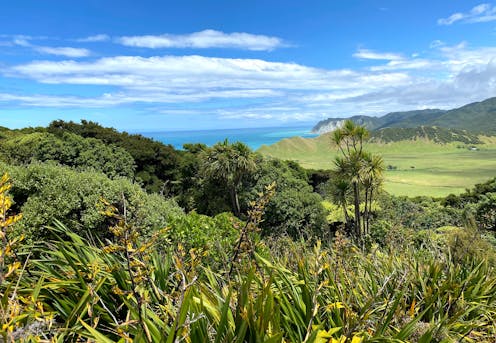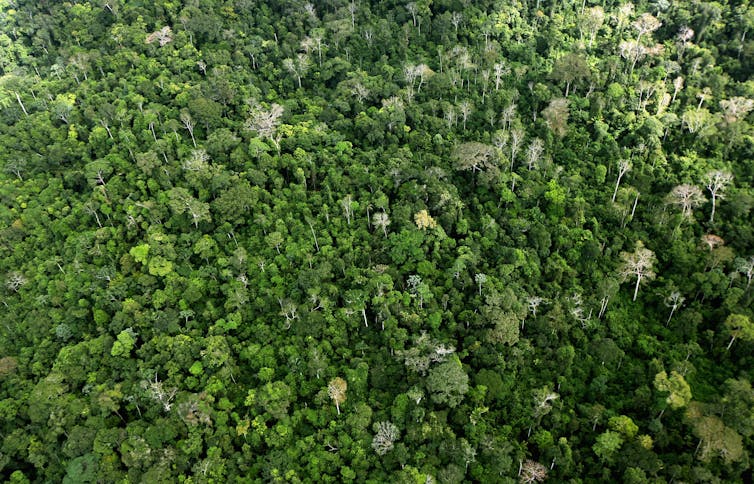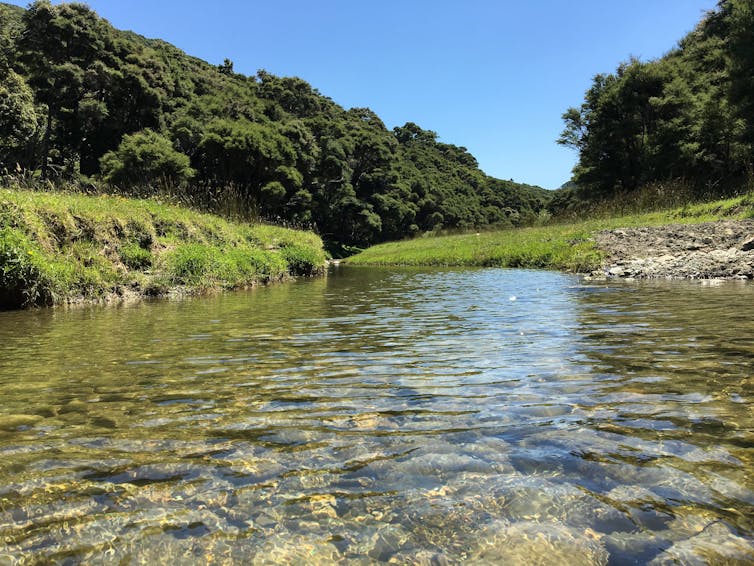 Renee Raroa Renee Raroa, CC BY-SA
Renee Raroa Renee Raroa, CC BY-SAAs the latest global biodiversity summit gets underway in Colombia, finance for the conservation and restoration of nature is one of the key themes of negotiations.
Global wildlife populations have shrunk by an average of 73% in the past 50 years, according to the 2024 Living Planet report. Consequently, momentum is growing worldwide to deliver new nature markets, such as biodiversity credits, to unlock new sources of funding.
Basically, nature markets are systems of exchange that match demand for nature regeneration with a supply of nature-positive projects.
But this creates risks, as well as opportunities, for Indigenous peoples. Without due care for data sovereignty, Indigenous communities may lose out yet again.
Nature markets could enable Indigenous peoples to fulfill their duties of guardianship. But such markets could also forge a new form of colonialism, including enclosure and appropriation of habitats and species that Indigenous peoples have traditional connections to.
 Efforts to prevent deforestation have at times displaced Indigenous people.
Mario Tama/Getty Images
Efforts to prevent deforestation have at times displaced Indigenous people.
Mario Tama/Getty Images
This can occur overtly through formalisation of property rights over species, ecosystems and associated lands or waters. For example, efforts to reduce emissions from deforestation (REDD+) in developing countries have been troubled by instances where Indigenous communities were dispossessed from ancestral lands, alienated from place-based traditions or excluded from the commercial benefits of carbon trading.
The current surge for nature markets is attentive to these risks, with international commitments to avoid such mistakes. Yet the processes of colonialism can be less overt and more insidious.
Indigenous data
One neglected area is Indigenous data. This relates to traditional and cultural information, population data, oral histories and ancestral knowledge relating to the environment and natural resources.
If care is not taken with Indigenous data, there are serious risks of reproducing colonialist patterns of exploitation.
Data represents reality. Data helps decision makers to know whether their interventions are effective, even when they are far away from the ecosystems being protected or restored.
If data are accurate, authentic and timely, a funder does not need to set foot in a remote habitat to know whether its carbon stock or native species abundance are improving or declining.
Biodiversity credits represent one way to operationalise a nature market. They are basically a vehicle for data. The emerging methodologies are bundles of metrics and indicators that track biodiversity and ecological function.
 Biodiversity credits use metrics and indicators that track ecological function.
Renee Raroa, CC BY-SA
Biodiversity credits use metrics and indicators that track ecological function.
Renee Raroa, CC BY-SA
The data enable credit holders to make credible claims of biodiversity uplift, or avoided biodiversity loss, as a consequence of credit sales.
As a representation of ecological reality, data are at least one step removed from the habitats and species they represent. This opens up the potential for nature markets to rely on the exchange of verifiable data, without the need to commodify nature itself, and therefore impinge on the ownership rights of Indigenous communities.
However, data are not free from such considerations. To divert data into a system of market exchange raises a different but related set of concerns about ownership, benefit and sovereignty.
The rise of Indigenous data sovereignty
Indigenous data sovereignty is the right of Indigenous peoples to govern the collection, ownership and application of data about Indigenous communities, peoples, lands and resources. It relates to data produced by and about Indigenous peoples and the environments they have relationships with.
Nature and people are precious, so data that represent nature and people are imbued with that preciousness. As Māori practitioner Ngapera Riley has written:
Data is a taonga (treasure). It’s something that people gift us, and that we gift to others as we go about our daily lives.
In te ao Māori, data come in many forms. This includes whakataukī (proverbs), moteatea (chants), whaikorero (oratory), maramataka (calendar), whakapapa (genealogies), pūrākau (stories) and increasingly digital forms.
Consequently, we must take great care in how data are accessed, shared, stored and used. This is especially critical in a system of market exchange. The dominant markets of today are profit-driven, creating incentives for appropriation and exploitation.
Sovereignty means power
Indigenous peoples are conscious that, while there are risks in data and knowledge sharing, there are also opportunities. Indigenous data and knowledge is a living and evolving system, which can contribute to effective responses to environmental challenges, including the protection and regeneration of biodiversity.
The principles of Indigenous data governance emerged from deliberations about how to protect Indigenous sovereignty when sharing knowledge and data for academic research. These CARE principles hold that Indigenous data should be governed for collective benefit, authority to control, responsibility and ethics.
This is critically important in ecological research, which too often neglects duties relating to data about natural ecosystems and the people who live within them.
It is troubling that the recognition of Indigenous data sovereignty is largely lacking from the discussion of nature markets so far. Unless Indigenous data sovereignty is upheld, the legitimacy of nature markets will likely be irreversibly tarnished.
This is why, in a recent Biodiversity Credits Alliance discussion paper, we included Indigenous data sovereignty as a risk to be identified, understood and managed.
But Indigenous data sovereignty is more than a risk: it is a source of power. It is a right to self-determination, to choose how data are used and their value is distributed. By ensuring this right, nature markets might deliver on their promise of inclusive, sustainable prosperity.
David Hall is Policy Director for the Toha Network.
Mike Taitoko is a shareholder of Toha Foundry Ltd and a Trustee of Toha Network Ltd.
Nathalie Whitaker works for the Toha Network in various capacities, including shareholder of Toha Foundry and trustee of Toha Network Trust.
Renee Raroa is the Establishment Director of the East Coast Exchange, a venture in the Toha Network.
Tasman Turoa Gillies is Head of Operations for Takiwā, part of the Toha Network.

 1 month ago
56
1 month ago
56

